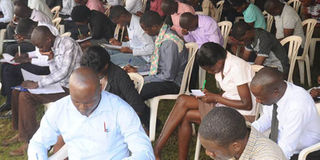Create meeting points for employers and employees

Search. Job applicants during a written interview recently. File photo
What you need to know:
- Under the plan, PLA seeks to undertake workplace inspections to ensure that there is compliance with labour standards, create awareness about human trafficking and child labour as well as the rights of vulnerable and marginalised workers in Uganda.
At least 45 per cent of the people at work find jobs by word from friends and relatives due to limited information in the labour market between job seekers and employers in the country, a senior government official has said.
Milton Turyasiima, the Assistant Commissioner for Employment Services in the Labour ministry, says: “You find the employers on one side having jobs and job seekers on the other side are looking for jobs but they cannot meet. We need to develop labour market system so that the two sides match,” he says.
Turyasiima says: “Knowing that at a hotel, there is a job, you will tell your friend or brother or sister and in most cases you find that may be you also bring those people whom you know are not qualified for the job.”
He made the remarks at the launch of five-year Strategic Plan for Platform for Labour Action (PLA) in Kampala. The plan is an important milestone to guide the organisation in implementation of its activities and projects.
“Let us not stop at documentation but try our best to achieve what has been laid in plan,” says Turyasiima, pledging that the ministry would continue supporting the arrangement.
Challenges in the labour market
He says although the labour and employment sector has gained increasing significance as an enabler of the development agenda, which is critical, the country continues to grapple with challenges facing the sector.
Turyasiima says the labour market in Uganda is characterised by high population growth and thus leading to a situation where we have many people we cannot create jobs for. “The low skills and low productivity of our labour force, underemployment or unemployment and more than 70 per cent of the young working Ugandans are uneducated,” he says.
Other challenges, Turyasiima says, are weak compliance with labour market regulations, which leads to low observance of the international labour standards.
“We have a big informal sector that is unregulated and there is a deficit of decent workers in the sector, gender inequalities in the labour markets, especially in the gender earning gaps,” says.
He appealed to PLA to support government in researching about the issue.
He says at least two million children are working instead of going to school, risking the future labour force.
Weak unions
Turyasiima says labour unions are still weak with the number of people in unions still small yet it is one of the institutions supposed to be fighting for the rights of workers.
Executive Director of PLA, Grace Mukwaya, says over the years, they have recovered more than Shs1.5b on behalf of more than 2,700 workers in the informal sector, among them the unpaid wages, the injured and unlawful terminations. “To the labour market, it means that before a person assumes a job, they have to sign contracts that are legal and employers have to understand that even oral contracts are legal because there are many ways to prove that they have worked,” says Mukwaya, adding that PLA advocates vulnerable and low wage earners.
We give legal services to all but the funds were recovered on behalf of mostly security guards, domestic workers, porters, shamba boys who are law income earners and teachers in private schools.
Plans
Under the plan, PLA seeks to undertake workplace inspections to ensure that there is compliance with labour standards, create awareness about human trafficking and child labour as well as the rights of vulnerable and marginalised workers in Uganda.
Lydia Bwite, the PLA lawyer, says the organisation plan also seeks to address household and individual poverty for vulnerable and marginalised workers as well as legal aids services in collaboration with District Local Governments and other partners.
“It will further support legal redress mechanisms to ensure that its target population receive due justice,” she says.




